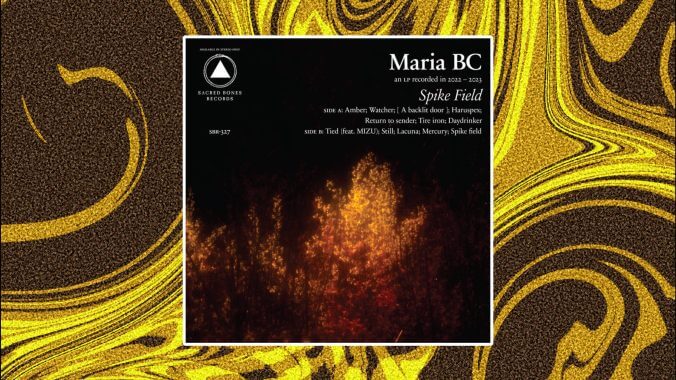On Spike Field, Maria BC Aims to Tear Time Apart
The Oakland singer/songwriter’s sophomore album finds remarkable beauty in uncertainty by tying humanity’s past to its far-away future.

Maria BC has made a habit out of interrogating time. In a 2022 interview with electronic artist Rachika Nayar, the Ohio-born, Oakland-based singer/songwriter joked about their inclination to use the uncommon quintuple meter in their music, noting it felt like an “inherent rhythm.” Much of Maria BC’s past work—on their 2021 EP Devil’s Rain and last year’s debut LP Hyaline—covered long-forgotten memories and unknown futures, told in staggered downbeats and ghostly, floating phrases.
But their newest album, the masterful Spike Field, isn’t just interested in mere questions: It aspires to tear apart time, inspect each shorn fabric and sew up each of its distant stretches to create a new, shimmering collage of the future-past. Within its intricately textured synth patterns, off-tune piano lines and yearning mezzo-soprano are tellings of intimate histories: some are past lessons; others are future warnings. The album’s first two tracks, “Amber” and “Watcher,” sound like a dual plea; plaintive guitar plucks and cautious swells of static and synth pads in the former seamlessly lead into the more explosive latter, where choraling cries attempt to comfort a wayward friend: “Weren’t you on your knees? / Weren’t you closing a broken seam?” Maria BC’s voice, based in the church and classically trained, glides into a differently risen peak at each phrase, accenting the word “on” with such grandeur that I nearly always get shivers when I listen—would that we all had a friend so willingly attuned to our mental recovery.
Spike Field is an overwhelmingly expansive sequel to Hyaline, building on the former’s melancholy sound and almost-pop melodies with full arrangements that soar but don’t suffocate. Maria BC chose, for the first time, to have another person mix their album—the artist Ruairi O’Brien—and the result allows for each of its delicate sonic elements to be heard clearly and with purpose, like in “Lacuna,” a breathless instrumental march into distortion. But this isn’t a polished record, nor does it want to be—throughout, you can hear the doubling of Maria BC’s voice just a millisecond off of each other, creating the tiniest of echoes that could persist eternally. Likewise on “Haruspex,” a dusty blue-collar lament on bodily sacrifice, conflicting guitar licks run through each other but never in competition, reflecting the many worries that a physical form carries: “Is my body right?” Maria BC wonders among the sound of metallic rattling. “A pound of flesh, a dime for the haruspex.”
-

-

-

-

-

-

-

-

-

-

-

-

-

-

-

-

-

-

-

-

-

-

-

-

-

-

-

-

-

-

-

-

-

-

-

-

-

-

-

-








































